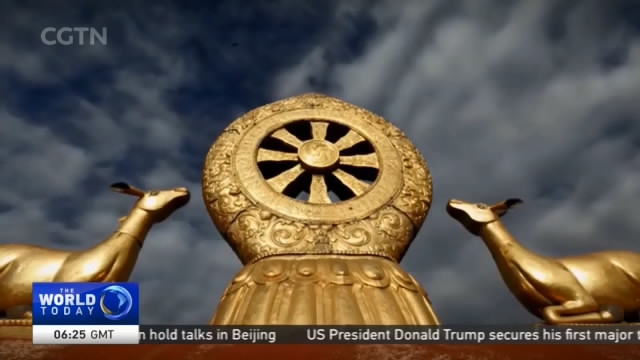
14:50, 28-Mar-2018
Tibet Development: Lhasa fighting poverty through gov't initiatives, industry dev't

The Tibet Autonomous Region, with its magnificent scenery and rich Buddhist culture, is a dream destination for many travelers. However, restricted by geological conditions, its economic and social development has for a long time lagged behind the rest of China. To help Tibet catch up, the central government has implemented a host of development initiatives in the region. Our reporter Yang Jinghao visited Lhasa to review the region's development. Today we follow him into its capital, the holy city of Lhasa.
43-year-old Tsring Padrup is looking to acquire some computer skills to help him adapt to his new job as Deputy Director of a residential neighborhood in Chengguan district. In 2016, his family was relocated into a well-equipped modern house here from a remote village on the outskirts of Lhasa, thanks to a nationwide poverty alleviation initiative.
TSRING PADRUP TIBETAN RESIDENT "Our life is completely different here. For example, in the past, I had to take a motorcycle or tractor for hours to see a doctor; but now, the hospital is just around the corner. Also, it's a lot easier for children to go to school."
It's a real U-turn for Tsring. Just like most rural Tibetans, his family had relied for years on traditional farming to make a living, such as highland barley cultivation and yak herding. In the off-season, he would work as a tricycle driver in downtown Lhasa to support his family.
More than 300 needy families have benefited from targeted relocations such as this. Apart from free housing, the farmers and herdsmen also have a variety of ways to make a living. Some of them have even found jobs in a comprehensive industrial park.
YANG JINGHAO LHASA, TIBET "The cow farming is one of the major industries of the industrial park, which is benefiting local farmers in different ways. More importantly, it provides numerous employment opportunities for people relocated from remote areas."
TSEWANG TENZIN RELOCATED VILLAGER "I used to earn very little by herding yaks in my village. Now, I can earn more than 3,000 yuan each month. It's a big change for me.”
Established in 2013, Zhizhao Industrial Park integrates several industries, including modern farming, tourism and logistics. It now serves as an impetus for the city's economic development, and its new business model – which involves the government, agricultural cooperatives and farmers – means it's perfectly set up to fight poverty.
WU JIE GENERAL MANAGER, CHENGGUAN JINGTU AGRICUTURAL DEV'T CO. "All the lands here are from local farmers. They can get a fixed sum of money for land transfers each year. Then they can work here and are paid more than 3,000 yuan each month. At year-end, they are entitled to their quota of the profit."
Chengguan has become one of the first districts in Lhasa to be lifted out of poverty. And its government is drawing an even bigger blueprint for further development, such as further exploring its tourism resources.
The changes are now inspiring the younger generations. Tsring's eldest daughter says her goal is to go to university in Lhasa where she can learn both Mandarin and Tibetan, as she believes the future development of her hometown can be as good as the inland cities, or even better.
Yang Jinghao, CGTN, Tibet Autonomous Region.

SITEMAP
Copyright © 2018 CGTN. Beijing ICP prepared NO.16065310-3
Copyright © 2018 CGTN. Beijing ICP prepared NO.16065310-3